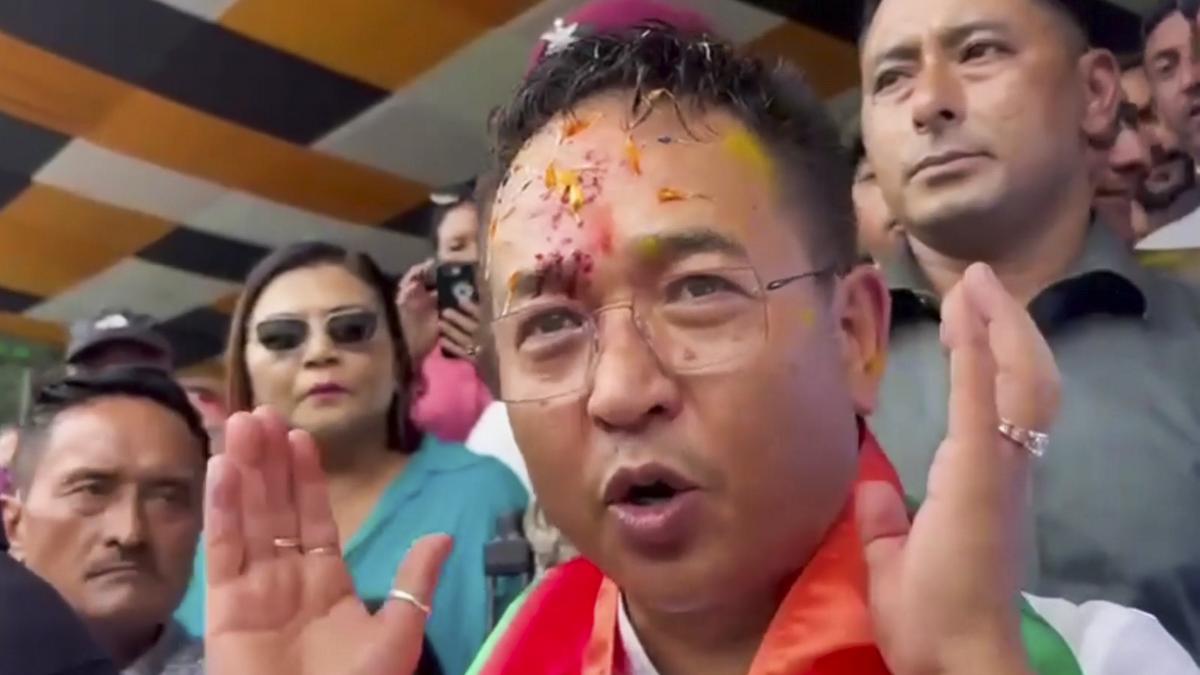
Sikkim Krantikari Morcha: The second-time victorious dissident
The Hindu
Sikkim Krantikari Morcha (SKM), which swept the 2024 Sikkim Assembly polls, brings winds of change to the northeast State, focusing on equitable wealth distribution and anti-incumbency sentiment.
In the landlocked State nestled within the Himalayas in the northeast, Sikkim Krantikari Morcha (SKM) has been rather synonymous with the “winds of change”. The basis of their foundation or their political messaging has always rather been around the same premise. A perusal of their doctrine sees them emphasising “equitable wealth distribution” or “equal prosperity”. As captured in a Frontline report (May 2019), while the Sikkim Democratic Front (SDF) placed themselves with focus on peace, stability and development of their rather long reign, the SKM focused on the anti-incumbency sentiment. This was further backed by allegations of corruption and nepotism within.
With the SKM securing a continued stay at the State’s top administrative office, a deep dive into its origins best reflects the prerogative and the “winds of change” they sought for the State.
In 2013, the now-incumbent Chief Minister of Sikkim Prem Singh Tamang ‘Golay’ left the SDF. What preluded the move was Mr. Golay’s run-ins about favouritism within his erstwhile party. Mr. Golay’s unhappiness with the party and the difficulties he was facing in pursuing “people’s work” was already known. In his resignation letter to then Chief Minister and president Pawan Kumar Chamling, Mr. Golay had sought that the SDF was never the former’s “private intellectual property”. He held that the SDF was formed to support the people against nepotism, communalism and exploitation. “But under your leadership, this party was used as a resource only for you and exploiters and realising the injustice towards poor Sikkimese people, I am writing this resignation letter,” read his resignation letter, as captured in newspapers.
Mr. Golay specifically indicated that the corruption allegations against Mr. Chamling that he had initially dismissed as political allegations had turned otherwise. He pointed to how Mr. Chamling took out a gazette notification to prevent the CBI from entering Sikkim.
Before his eventual exit in 2013, Mr. Golay was the subject of multiple confrontations with the SDF president. In 2014, he went on to contest two seats, namely, Upper Burtuk and Namthang-Rateypani, for the SKM — the party that was founded by his supporters earlier. While the former Minister for Animal Husbandry, Ecclesiastical and Industry Department and an MLA from the same region managed to secure the leadership for the constituency, he lost in the latter.
The SKM would go on to unseat the SDF after a quarter of a century stay in the country’s top administrative office in 2019.
A common prerogative of parties from northeastern India is to form alliances at the Centre to pursue their own developmental agendas. The SKM has been no different. However, with the focus turning to the much emotive issue concerning Article 371F after the dilution of Article 370 — that led to the reorganisation of the erstwhile state of Jammu and Kashmir — an alliance with the BJP in Delhi would not bode well for their political prospects.

The Karnataka government has drafted a comprehensive master plan for the integrated development of Kukke Subrahmanya temple, the State’s highest revenue-generating temple managed by the Hindu Religious Institutions and Charitable Endowments Department. The redevelopment initiative is estimated to cost around ₹254 crore and aims to enhance infrastructure and facilities for devotees.












